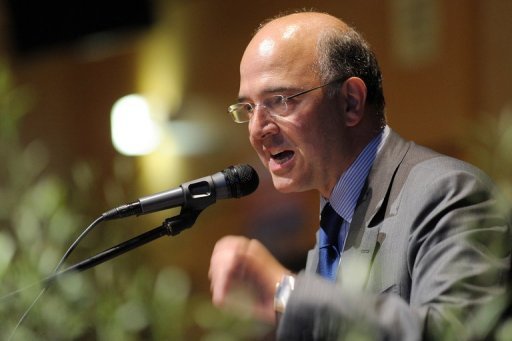Greek euro exit not ruled out if loan deal broken: France
 |
| A Greek exit from the eurozone will be on the agenda if Athens fails to impose austerity measures required in its EU-IMF bailout deal, French Finance Minister Pierre Moscovici, pictured in May 2012, said Sunday. |
And commenting on the Spanish government's refusal to accept foreign aid to help it through its debt crisis, he said the sovereignty of the Madrid administration should be respected.
Moscovici was responding to questions about comments made by Greece's radical leftist leader Alexis Tsipras who said Friday he wanted to scrap the bailout deal if he won the June 17 elections.
Moscovici said he hoped Greece would remain in the eurozone.
But commenting on Tsipras' position, he told French television: "That poses a problem.
"If the Greeks themselves do not respect their commitment, then we would find ourselves in a situation which would be infinitely more complicated," he added.
Asked if his ministry was working on a scenario in which Greece quit the eurozone, he stressed that while they might have looked at it "here and there" they were working on plans to avoid it rather than anticipate it.
Tsipras's Syriza party surprised Europe on May 6 by placing second in an inconclusive election in which no party was able to either win an overall majority or broker a coalition government.
But voters fed up with salary and pension cuts shifted their loyalties to more radical parties.
A series of opinion polls published Friday showed that neither Syriza nor its main rival, the conservative New Democracy party, would win an outright majority in new elections called after last month's electoral deadlock.
The June 17 vote will determine whether Greece will meet the terms of a deal under which the European Union and International Monetary Fund agreed to lend it hundreds of billions of euros (dollars) in return for economic reforms.
On Saturday, Spanish Prime Minister Mariano Rajoy tried to play down fears the country would need an international bailout, saying the country would eventually find its way out of the financial crisis on its own.
Moscovici expressed sympathy with Madrid's position.
"I understand absolutely that a country such as Spain ... does not want others to lay down the law or interfere in its own affairs," he said.
It was Spain to decide if it needed an IMF bailout, he insisted.
What the stars mean:
★ Poor ★ ★ Promising ★★★ Good ★★★★ Very good ★★★★★ Exceptional
Latest News
More News
- Foreign leaders extend congratulations to Party General Secretary To Lam (January 25, 2026 | 10:01)
- Russian President congratulates Vietnamese Party leader during phone talks (January 25, 2026 | 09:58)
- Worldwide congratulations underscore confidence in Vietnam’s 14th Party Congress (January 23, 2026 | 09:02)
- Political parties, organisations, int’l friends send congratulations to 14th National Party Congress (January 22, 2026 | 09:33)
- 14th National Party Congress: Japanese media highlight Vietnam’s growth targets (January 21, 2026 | 09:46)
- 14th National Party Congress: Driving force for Vietnam to continue renewal, innovation, breakthroughs (January 21, 2026 | 09:42)
- Vietnam remains spiritual support for progressive forces: Colombian party leader (January 21, 2026 | 08:00)
- Int'l media provides large coverage of 14th National Party Congress's first working day (January 20, 2026 | 09:09)
- Vietnamese firms win top honours at ASEAN Digital Awards (January 16, 2026 | 16:45)
- ASEAN Digital Ministers' Meeting opens in Hanoi (January 15, 2026 | 15:33)
















 Mobile Version
Mobile Version